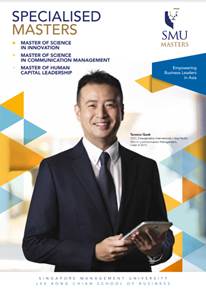
Finding success later in life is more common than you would think. In fact, many of the most successful people in the world came into their own as they grew older.
Christopher Boey, Business Development Manager at global healthcare company Novartis, is a perfect example. He only began to excel in his studies in secondary school as a Normal (Academic) student. Christopher went on to obtain a degree in engineering and now, he's a recipient of the SMU Leadership Scholarship in the Master of Science in Innovation (MI) programme.
“Growing up, I didn’t have clear career goals; neither did my parents force me to do something I didn’t want to do,” recalls Christopher, who studied chemical engineering at a polytechnic and university.
“Having only excelled in my studies when I was in secondary School, I was a late bloomer. Math and science were my stronger subjects, hence the natural gravitation towards engineering.”
In his current role at Swiss-based healthcare behemoth Novartis, Christopher develops business development strategies and is responsible in driving the real estate and infrastructure assessment of manufacturing sites in Singapore. The objective is to enable the sustainable development of Novartis’ pharmaceutical production facilities, and focus on real estate and the acquisition of new tenants.
His job description has certainly evolved dramatically since he joined the company as an intern in 2016, working as a process expert. Over the years, Christopher focused on maintaining Good Manufacturing Practice (GMP) standards as a Documentation Specialist, ensuring an uninterrupted supply of quality medicine for patients all over the world.
“I decided to take the leap of faith to do something completely different from what I was used to,” shares Christopher, who was appointed a Business Development Manager in 2021.
“Even though my industry background is in manufacturing, I have always been interested in the commercial and business aspects. Coincidentally, there was a Business Development Manager role at Novartis, which I eventually decided to apply for.”
Tackling innovation challenges of today (and tomorrow)
It is often said that top engineers make the best businesspeople. After all, engineering requires a unique combination of analytical thinking and creative problem-solving – skills that are also essential for business success. But making the leap from manufacturing to business strategy can be daunting, especially for professionals who are used to dealing with concrete problems and specific solutions.
Christopher admits that his previous role was mainly based on the “shop floor” where manufacturing occurs. As a Documentation Specialist, he reviewed batch record documentation to ensure that production complied with technical specifications and regulatory standards.
Today, his job scope includes designing well-executed business strategies that consider the future growth of stakeholders, employing state-of-the-art equipment and processes, and optimising efficiency whilst keeping costs down. Therefore, business strategists like Christopher must have a clear vision for where their organisation is heading to make sure that initiatives can scale effectively with future demand.
The SMU MI programme is designed for the next generation of innovation and entrepreneurial leaders. It offers a cross-disciplined and practical education in entrepreneurship and innovation, with world-class faculty, regular engagement with thought-leading practitioners, and a study stint abroad at a top business school.
“It is broad-based and has the right amount of depth,” says Christopher, who embarked upon the MI programme just as he settled into his managerial role.
“I could appreciate and closely relate to the topics learnt in class such as finance, strategy, business model innovation, design thinking, supply chain, leadership, and even corporate social responsibility – the knowledge acquired in class could be applied to my workplace which I found extremely helpful.”
An innovative mindset to propel one’s career
Indeed, the degree can help with a mid-career change by providing the necessary skills and knowledge for a professional pivot, equipping students with the skillsets to identify problems and develop creative solutions. Whether the objective is to disrupt existing markets or differentiate themselves professionally, MI graduates acquire practical tools through coursework and experiential learning, enabling fresh opportunities across multiple industries.
Moreover, for those who seek a holistic learning experience beyond the classroom, SMU interactive pedagogy is an ideal fit. Small, seminar-style classes promote group discussions and two-way interactions between students and professors, fostering a collaborative learning environment. In addition, regular opportunities for feedback ensure that each student has a voice in the learning process. This approach to education promotes independent thinking and creative problem-solving, competencies essential for success in today's global economy.
“The open discussions on the case studies were extremely enlightening, and useful for grasping concepts,” notes Christopher.
“Not only did I get to learn from my peers who hailed from diverse backgrounds and shared their personal experiences, I was also able to share my perspectives.”
“Given that I come from an analytical, data, process-driven background, I was able to analyse problems in a more structured way, which is fundamental in recognising opportunities, and driving innovative solutions for customers.”
The MI programme is also designed to equip aspiring leaders with the theory, skills, capabilities and experiential learning to lead innovation in large organisations. Through interactive lectures, case analyses, field trips, projects, and assignments, the pedagogy supports Asia's need for new business creation and innovation.
Notably, it offers participants a unique blend of academic rigour and practical relevance, delivered by a world-class faculty. The coursework is tailored to challenge students and provides opportunities to gain real-world experience through internships and projects with leading organisations, unveiling opportunities for innovation leadership.
“My career goal for the next five years is to work as a strategy consultant for growing businesses,” Christopher elaborates.
“As I continue to develop my managerial skills and build my professional network, I am confident that I have what it takes to bring value to any organisation.”
Speak to our Admissions Advisors
Lee Kong Chian School of Business
Postgraduate Admissions
Singapore Management University
Level 4, Postgraduate Programmes Office
50 Stamford Road, Singapore 178899
Tel: +65 6828 0882
Join us at the upcoming events
Ofukacho, 1−1 ヨドバシ梅田タワ
Osaka, Kita Ward, 〒530-0011, Japan
Kyobashi, 1 Chome−3−5 三井ガーデンホテル 1F
Chuo City, Tokyo, 〒104-0031, Japan
